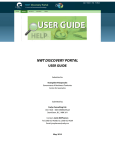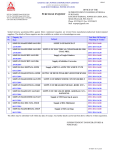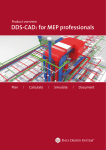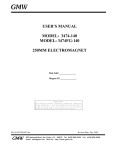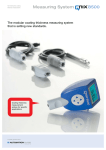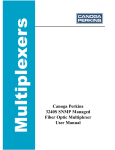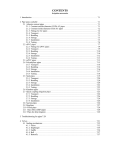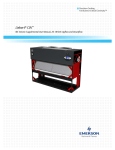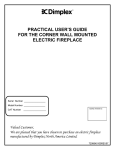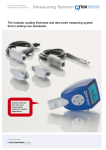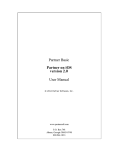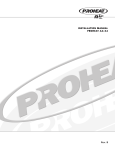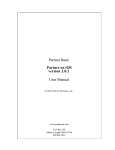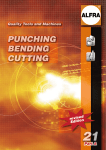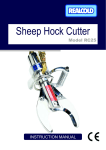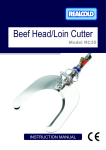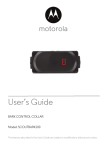Download Choosing the right tools for the job
Transcript
Choosing the right tools for the job • Power screwdriver • Drills and drill stands • Drill bits • Hole saw • Nails, screws, bolts and washers • Staple gun • Power planer • Power sanders • Circular saw • Jigsaw • Router • Hammers • Other essential tools • Multitool—Dremel • Making a picture frame Tools, DIY, Hardware & Storage Contents Power screwdriver ........................................................................... 3 Drills and drill stands ........................................................................ 4 Drill bits ........................................................................................ 6 Hole saw ..................................................................................... 8 Nails, screws, bolts and washers ........................................................ 9 Staple gun ..................................................................................... 14 Power planer .................................................................................. 16 Power sanders ................................................................................ 18 Circular saw .................................................................................. 21 Jigsaw ........................................................................................... 24 Router ........................................................................................... 25 Hammers ....................................................................................... 27 Other essential tools ......................................................................... 29 Multitool — Dremel .......................................................................... 30 Making a picture frame .................................................................... 31 1 INTRODUCTION A power tool is a handy DIY device, and although it is fun to use and opens a world of DIY possibilities, please remember that it is not a toy and should never be given to children to play with. Here we briefly introduce you to a number of power tools and their uses. Always remember to wear the correct safety items for the tool you are using and to read the user’s manual in full. SAFETY Tie up long hair, take off jewellery and don’t wear loose clothing. Safety glasses, a dust mask and ear plugs are the first consideration when working with power tools. Gloves are needed for handling timber or steel and preventing minor injuries but when using power tools they provide little protection against a turning blade. Some people work without gloves when using certain power tools so they can maintain fine motor control of their task. Remember to read the operating instructions for all machines and never modify or use incorrectly. CORDLESS VS PLUG IN • Cordless tools are convenient and save time and can be used away from a power source (just remember to charge your battery). The batteries are usually Nickel Cadmium or Lithium ion. Lithium ion is the new technology with significant benefits of no memory build up and holding a charge for longer. • Plug-in electric tools always have power available so you can finish your job without interruption (except during blackouts). • Some corded tools are more cost effective to the DIY user than the cordless option. Buy a compact drill if you’re planning a lot of repairs or DIY projects as they can also be used as power screwdrivers. However, they are a lot bulkier than purpose-built power screwdrivers. USING A GUIDE • Circular saws, jigsaws and routers have adjustable fences that you can move up to about 150 mm from the edge of the workpiece to use as a guide. • To make a cut beyond the limit of the fence, clamp a batten across the workpiece, parallel to your marked cutting line and at the right distance from it to act as a guide when you run the edge of your tool’s baseplate along it. • Align the tool’s guide notch with the cutting line and double check the position of the batten before starting the cut. Make sure the clamps holding the batten won’t obstruct the tool as you go. • An alternative is to mount the tool on your workbench. • Some tools also have stationary versions. Using a fence attached to your workbench is more accurate than using a clamped batten. 2 Power screwdriver POWER SCREWDRIVER A power screwdriver can be cheaper than an entire range of manual screwdrivers as it comes with a complete set of tips. An even cheaper option is to buy a manual screwdriver that comes with a set of tips. A rechargeable screwdriver is a handy addition to your hardware cupboard. While a good old manual screwdriver will always have its place, a power screwdriver can save you space, time, energy and money. Essentially, it is a gun-shaped tool (not unlike a small drill) with changeable bits. A power screwdriver is great for constructing flat-pack furniture, installing cupboards or upgrading parts in your computer. Remember when buying one to check what type of rechargeable battery it uses. Lithium Ion is always the best option. 3 Take your drill with you when shopping for a drill stand so you can make sure it fits in the clamp and you buy one that works with your drill. Drills and drill stands DRILLS A power drill is an essential home DIY tool. Not only does it have attachments that allow you to drill holes and screw in fasteners, but a load of other accessories which allow you to polish, buff and grind (although using a grinding or cutting disc on a drill is very dangerous; that’s why an angle grinder has a safety guard). Use the wire brush attachment for polishing metal and removing rust, or the hole saw attachment for cutting holes. Impact, hammer and compact drills are designed for drilling different materials. Compact drills are good for wood, metal and plastic. Should you want to put up a shelf or hang a picture on a brick and plaster wall, then you will need a hammer drill. Rotary hammer drills are used for drilling into stone and concrete and are 4 therefore more suitable for the DIY enthusiast or commercial customers. Rotary hammer drills have options to fit standard drill bits using a SDS chuck adaptor. A power tool is only as good as the accessory you use it with. Remember when drilling to choose the right bit for the application. Use a masonry bit for drilling into plaster and brick and a high speed steel (HSS) bit for drilling into metal, wood or plastic. If your drill didn’t come with a case, you’ll need to get one to store it and your drill bits in. Take the drill with you when buying the case so you can make sure everything fits securely in the case. HOW TO USE DRILL STAND AND PRESS Most holes need to be drilled at right angles to the surface. • For a smooth hole, drill it out more than once. • Use the right attachments for sanding, polishing, wire brushing, grinding, cutting holes, tightening bolts, sharpening edges. 1 1 If you have a good eye, check from two angles against known verticals and horizontals, such as a window frame’s top and sides, that you are holding the drill at more or less the right angle. This is good enough for many drilling jobs. A drill stand is bolted permanently to a workbench, or can be clamped to a table with vice grips. It features a vertical pillar with a sliding clamp on it into which you can dock your drill. This turns it into a drill press. Drill presses are designed for drilling accurate, uniform holes at precise angles in wood, metal or plastic. This accuracy is important for jobs such as making dowelled joints or drilling the recesses in cabinet doors for spring-loaded hinges. SAFETY NOTE 2 2 For more accuracy, hold the drill in position and stand a try square on the surface you are drilling into. The drill bit should be parallel with the vertical blade of the try square. Make sure your drill stand won’t move by connecting it tightly to your table or workbench. Also make sure the drill itself is properly connected to the stand and that the bit is properly inserted in the chuck. The large forces involved when drilling can lead to serious injury if the equipment is not set up correctly. SAFETY GEAR • Safety glasses • Gloves • Dust mask Hammer drills create a lot of dust. To reduce the mess, tape an open envelope to the wall just below where you’ll be drilling and most of the dust will fall into it instead of onto your floor or carpet. Or you could use a factory-made drill dust collector. 5 Drill bits DRILL BITS These come in all sizes and are usually designed for use with specific materials. Masonry bits are for drilling into stone, concrete, bricks and plaster; wood bits for drilling into wood; and steel bits for drilling into metal (although they can also be used on wood and other softer materials). SDS bits are required for rotary hammer drills. WHAT ARE DRILL BITS MADE OF? frequent sharpening. High speed steel (HSS) bits or cobalt steel alloy bits are best. Some bits have tips made of tungsten carbide or other carbides (hard materials which can drill into almost anything). Just the tips are made of this material because it is brittle and costly. Most universal bits are made of high speed steel (HSS). Don’t buy low or high-carbon steel bits as, though they might be cheap, they will require 6 BIT COATINGS Bits are also coated to increase their lubricity as well as their resistance to heat and corrosion. The coatings used include black oxide (quite common and inexpensive), titanium nitride (TiN), titanium aluminium nitride (TiAIN), and titanium carbon nitride (TiCN). All can extend the life of a bit up to five times. BIT SHAPE TWIST DRILL This is the universal type of bit, used for making holes in wood, metal, plastic and many other materials. Most are made out of high speed steel (HSS). However, they are not suitable for masonry. Generally, twist drills don’t need pilot holes as they are self-starters. Being general purpose bits, they are a good DRILLING INTO METAL choice if you are stocking your tool cupboard and don’t have a particular project in mind. STEP DRILL OR UNIBIT Additional bits for drilling into metal include the spotting drill bit, used for creating a pilot hole; the core bit, for enlarging an existing hole; and the countersink bit, for creating a countersink hole. DRILLING INTO WOOD Additional bits for drilling into wood include the auger bit, for drilling fast clean holes in softer woods; the brad point bit, which reduces the tendency of a twist drill bit to wander when starting a hole; and the paddle or spade bit, for drilling larger holes. DRILLING INTO MASONRY (BRICK AND CONCRETE) This bit is conical in shape with a stepped look. It allows you to drill many different size holes in wood, metal and plastic, all with the one bit. You could use it to drill a hole and then add a countersink recess, or for enlarging a hole you’ve just made with it. These are best suited to sheet metal usage. The masonry bit’s tungsten carbide tip makes it easy to pick out from the other bits in your toolbox. Masonry bits are always used with hammer or impact drills, and are necessary for home DIY projects such as hanging shelves, a heavy mirror or pictures on an internal wall, fixing a garden basket to a concrete beam, or for installing outdoor lighting. 7 Hole saw This very useful accessory for a drill basically consists of a cupshaped saw with a pilot bit in the centre for creating a pilot hole. It is available in a large range of diameters and is ideal for cutting the holes in cupboards when plumbing in washing machines and dishwashers, as well as the holes for door handles and taps. Hole saws are also available with tungsten carbide points suitable for metal and tile cutting. HOW TO USE Although a hole saw is not strictly designed for this, you can use one to cut discs out of wood, plastic and thin sheet metal for various uses. 2 1 1 Fit the saw onto your drill. Set the drill to a slow speed. Place the tip of the pilot bit bang in the middle of where you want the hole and start the drill. When the pilot bit reaches the right depth, the saw will start cutting into the material. The hole will be completely round if you are holding the drill at right angles to the surface. When working with plastic, run the drill as slowly as possible to stop the plastic melting through friction. 8 2 If you are cutting a workpiece on your bench, clamp some scrap wood under it and saw through the workpiece into the scrap to ensure a clean exit hole. Alternatively, cut through the material until the pilot bit appears, then drill back into it from the other side. Nails, screws, bolts and washers NAILS SAFETY GEAR Nails can be used to join two pieces of wood or to attach something to wood or brick (however you will need extra power to hammer one into brick). If your nails are going to be used for an outdoor project, then choose galvanised ones that won’t corrode or rust. PANEL PINS ROUND OR OVAL NAILS Small, thin nails with almost no heads used for fine carpentry and joinery work. Great for small DIY jobs. The flat, rounded heads of these make them easier to hit with a hammer. The shape of oval nails is designed to reduce the risk of them splitting • Safety glasses • Gloves the wood. They’re used where a rough finish is acceptable, such as underneath a deck or under wooden flooring. 9 CLOUT NAILS To prevent the heads of ungalvanised nails from rusting under water-based paint, dab them with a rust inhibitor before painting. CARPET TACKS Clout nails have large flat heads and are excellent for fixing roofing and ceilings. Choose galvanised or copper ones or they will rust when you paint over them with water-based paint. FENCE STAPLES Usually used to fasten carpeting to a wooden floor. RING SHANK NAILS U-shaped nails designed for attaching wire fencing to the posts. Make sure you choose galvanised ones to prevent rust and corrosion. 10 Nails with grooved shanks which give them better holding power. Most commonly used in roofing and construction work. SCREWS Always choose the correct screw for your project, as screws are designed to be used with specific materials (wood, metal, masonry) and for specific uses (to hold a load, join, fix in place). Also choose the correct size. Lightly stressed items need smaller screws (a post box or bird feeder) while heavily stressed items need larger screws (chairs and other weight-bearing objects). CHOOSING YOUR SCREW For joining two pieces of wood, a screw needs to be long enough to go through the one piece and halfway through the second. Screws are sized according to their diameter in millimetres, known as their gauge number, and their length. A versatile screw is the 4x50 (4 mm by 50 mm long). For heavier duty fixing you can use a 75 mm screw. Always remember ‘leftyloosey, righty-tighty’ – i.e. turning a screw anti-clockwise loosens it and turning it clockwise tightens it. COACH SCREWS SOLID BRASS SCREWS Used for a decorative finish when the head will be visible in the finished work. They are corrosion resistant thus they can be used indoors or outdoors. Designed for joining heavy timbers or metal and wood. The hexagonal head can be tightened with a spanner or pliers. The strength and durability of coach screws makes them ideal for outdoor furniture and structures (jungle gyms, swing chairs) that get a lot of use. 11 SELF-TAPPING SCREWS Before driving a screw into wood, it’s advisable to drill a pilot hole for it, using a bit smaller than the diameter of the screw. This will ensure that the screw doesn’t split the wood. These are designed for both drilling and tapping their own holes as they are screwed in. HAMMER SCREWS Hammer screws (also known as nail-in-anchors) are sold as one with anchoring plugs. After drilling a hole and hammering the screw and plug combination in, you can then take out the screw, if necessary, to attach something to it. Ideal for hanging heavy items on brick and plaster walls. 12 If you need to match screws to a fitting, make sure their shanks are able to pass through the attachment holes in the fixture. They should also be long enough to pass halfway through the material you are screwing them into (unless the material is really thick, in which case just make sure you use ones long enough to support the fixture). Strap some masking tape around the drill bit as a guide to how deep you should make your hole. Stop when the guide touches the wood or wall. NUTS, BOLTS AND WASHERS Bolts are most often used together with nuts and washers to fasten items together. In effect they clamp the items between the head of the bolt and the nut, which is screwed on the other end of the shank. First you have to drill holes of the correct size for the bolt to slip easily through the items. Washers help make the fastening more secure by providing flat surfaces under the bolt head and nut. This is necessary when joining items with curved or uneven surfaces, such as gum pole furniture. COACH BOLT GUTTER OR ROOFING BOLTS These have countersunk or domed heads and a short square section just under the head. They are ideal for wood as the square part sinks into it, preventing the bolt from turning when the nut is being tightened. They are also known as carriage or cup square bolts. These have low, slotted, mushroom-shaped heads and usually come with square nuts. They can be used for many DIY projects, not just roofing. Their bright zinc finish makes them suitable for exterior use, as they can be exposed to all kinds of weather without rusting. MACHINE BOLT CONCRETE ANCHORS These have either square or hexagonal heads and are fastened using a spanner and similarly shaped nuts. They also come in large sizes, where the length increases with the diameter. If whatever you are making or repairing is going to be exposed to the elements, make sure you use stainless steel or galvanised nuts and bolts so they won’t corrode or rust. These are used in concrete and masonry where you can’t reach the end of the shank to tighten them. There are various designs. Typically, the shank is covered by a thin sleeve which butts up against the nut. As the head of the bolt (or screw) is tightened, the nut is drawn towards it, forcing the sleeve to expand and jam the assembly in the hole. Alternatively, the assembly is reversed and you tighten the nut. Afterwards you can remove the nut or bolt to add attachments. Some concrete anchors have readymade eyes for this purpose. NUTS Nuts are what you screw onto bolts to fasten them. Plain steel nuts are relatively strong and good for many home DIY projects. However, they should only be used indoors. For outdoors, choose their stainless steel cousins. Wing nuts are for when you often need to loosen and tighten the nut. The wings make it easy to turn the nut by hand. 13 Staple gun This is a very versatile tool to add to your home DIY arsenal, being really handy for small repairs and projects and able to drive heavy duty staples (of various sizes) into wood and plastic. If your staples are not flush with your material, try exerting more pressure on the gun while squeezing the trigger. You can use your free hand to help stabilise the gun while squeezing the trigger. SAFETY HINT The staple is ejected at high speed, so take care not to fire the gun until it’s securely pressed against the workpiece. 14 A powered (battery or plug-in) staple gun is great for people with carpel tunnel syndrome, arthritis, or who lack the strength to use a manual staple gun. You might also want to go for a powered one if you have a lot of stapling to do. SAFETY TIPS There are also electric or cordless staple guns. An extension cord is required as their own cords are very short. A cordless staple gun is handiest, but you need to make sure the battery is charged before using it. Also, if you have a lot of stapling to do, you might run out of power before finishing the job. Staple guns are just the thing for art and craft projects, but too dangerous to be used by children as the force with which the staple is ejected can cause considerable damage and injury. So make sure you never point a staple gun at anyone, and keep your fingers away from its nose. 15 Power Planer Also known as Buzzers, power planers use rotating blades to remove chips of wood as you move them along. A hand planer uses a stationary blade and takes a lot more muscle power to move, as well as a lot more of your time. HOW TO USE 1 1 Draw lines on the workpiece at the level you want to plane down to, set the cutting depth on the planer and fit the fence. 16 Use a piece of scrap wood to rest the nose of your planer on when putting it down. Make sure the blades don’t touch the work surface as they could get blunted or soiled. If you make this a habit you won’t have to wait for the blades to stop spinning before putting your planer down. 2 2 Place the front of the baseplate against the end of the workpiece, with the fence up against the side, and switch the tool on. Move it forwards, guiding it with both hands. 4 3 3 As you complete each pass, let the planer run off the end of the workpiece. Repeat until you reach the marked lines. 4 Some planers come with a groove in the base plate which allows you to chamfer edges at 45˚. Run the groove in the baseplate along the edge of the workpiece. Mark guide lines on each face of the work and plane down to them. 17 Always make su re your workpiece is securely clamped to your workbench and hold your sander with both hands. Power sanders BELT SANDER This uses a seamless loop of sandpaper and is best for the initial stages of sanding, as it removes material rapidly. That also makes it ideal for shaping wood. Be aware that it is an aggressive tool with a lot of power and can damage surfaces quickly. Fitted with a different belt, it can also be used for edging and linishing (edge polishing) glass, metal and even masonry. 2 2 Fit the dust bag. HOW TO USE 3 3 Switch the sander on and 1 1 Release the tension lever for the rollers and fit a new belt over them, ensuring that the direction of rotation is correct (marked on the inside of the belt). Also check the tracking adjustment to ensure that the belt is positioned correctly. If it is not, it will run off the rollers and damage the belt and machine. 18 drive it over the surface you are sanding, making sure to move it with the grain if you’re sanding wood. Keep it moving all the time as it will remove too much material if left in one spot and you’ll end up with an uneven surface. Change to finer grade belts to achieve the finish you want. Always clamp your workpiece for safety. RANDOM ORBITAL SANDER This is used for sanding and smoothing wood, plastic and metal surfaces. It is most effective on large surfaces, such as a table or door, and is one of the simplest power tools to use. It’s designed to leave no scratch marks when used with a fine abrasive. HOW TO USE Belts sanders are best for aggressive stock removal. Orbital sanders are best for medium to fine finishes. Never hold a belt sander stationary or increase the pressure on it or you will create hollows in your work. They are designed to operate efficiently under their own weight. 1 1 Attach the sandpaper disc so the holes in it and the backing pad are aligned. • Run the handle of an old toothbrush over the belt while it is moving. The friction will melt the plastic and any debris on the belt will then stick to it. Cleaning a belt makes it last longer. • After each use and before storing it, clear the vents and clean the sander with an old paintbrush. 2 2 Fit the dust bag, if your model has one, or connect the sander to the hose of your vacuum cleaner using the adapter provided, and switch the vacuum cleaner on. Clamp your belt sander to your workbench, belt side up (essentially upside down), to create a mini grinder for sharpening blades and grinding chisels. 19 CORNER OR DETAIL SANDER For sanding around corners and into small spaces where an orbital sander won’t go. Also know as a mouse sander, some models have fingers and triangular sanding heads to get into hard to reach places. 3 GRIT GUIDE 3 Hold the disc on the surface you want to sand and switch on the power. Keep the sander moving backwards and forwards over the surface. Coarse (60) for removing paint and shaping your wood. Medium (100) for sanding before repainting, and for sanding without altering the shape. Fine (150) for sanding before applying a finishing coat of varnish. Very Fine (240) for smoothing a painted surface. 4 4 Be prepared to switch discs as you go to achieve the finish you want. For example, you might need to start with a coarse disc to remove an old finish, followed by medium and then fine discs to create a perfectly smooth surface. 20 Extra Fine (320) for smoothing between undercoats. Superfine (400) often used for wet sanding of varnish or lacquer for an ultra-smooth finish. Circular saw CIRCULAR SAW A hand-held circular saw is the best choice for home DIY. Clamp your workpiece to your workbench and move the saw over it to make the cut. Circular saws, dependent on model and blade fitted, can cut wood, metal, bricks and stone. A clamped guide is useful when working with a circular saw. Never use blades not specified for an application. HOW TO USE 1 1 Choose the right blade for the material you are cutting and always read and follow the manufacturer’s operating instructions. 2 2 Set the cutting depth. If you’re cutting right through something, make sure the teeth of the blade project 3mm beyond the material. Measure twice, cut once – it will save you a lot of heartache and materials. 3 3 Clamp the workpiece to your workbench and draw a line where you want to cut it. 21 MITRE SAW 4 4 Holding the saw with both hands, rest the front edge of the baseplate on the edge of the workpiece and align the narrow guide notch with your marked cutting line. This comprises a circular blade on a movable arm attached to a baseplate. The baseplate facilitates angled cuts. Mitre saws make quick, accurate, short cuts and can be used on wood, plastic and some light metals. The saw is bolted or clamped to your worktable and the arm is used to move the blade down to your workpiece. HOW TO USE 1 5 5 Start the saw and let it run up to full speed, then move it forwards until the blade begins the cut. Move the saw forwards slowly, with the baseplate flat on the workpiece and the fence against its side (if using one). 6 6 Let the saw run out at the end of the cut before releasing the trigger. Make sure the blade has stopped and the guard has sprung back into position before putting the saw down. 22 1 Measure and mark where you want to cut. Support the wood so it doesn’t fall and hurt you after being cut. 2 2 Because the blade on a mitre saw moves, you don’t have to feed your workpiece towards it, you just need to hold it in place. Don’t cross your arms when holding the workpiece and pulling the blade down. 3 3 Before switching the saw on, pull the blade down and check that it’s aligned with your cutting mark, then return it to its safety position (right back up with its guard in place). 4 4 Switch your saw on, then pull the blade down and through the wood. Let the blade come to a complete stop before removing it from the wood and lifting it back into its safety position. TABLE SAW A table saw is worth buying if you have lots of cutting to do. Here the blade sticks up from the baseplate (table) and you feed your workpiece over it. A table saw can be used for joinery cuts, crosscuts, ripping (cutting lengthwise with the grain) and reshaping boards. You can also buy attachments which allow you to true up crooked boards and shape and mould wood. When you buy wood from a Builders store they will cut it to size for you, so by planning ahead you can save time and money. Never use water on a saw blade as it will rust. Brush it clean without using any cleaner. If a blade is very dirty you can clean it with oil, but remember to wipe off any excess. BLADES Saw blades come in different sizes as well as with a specific number of teeth and a specific gullet size (space between the teeth). The number of teeth is a general guide to a blade’s cutting performance: many small teeth means a fine cut; fewer, large teeth a fast but coarse cut. Special blades are available for cutting manufactured boards and laminates. Keep the original packaging for storing a blade. If you’ve lost the packaging, hang the blade from a nail on the wall. Don’t hang several blades from the same nail without putting spacers between them or the cutting edges could get damaged. 23 Always clamp your workpiece to your workbench as a jigsaw tends to grab at the work and if you simply hold it with your free hand, you won’t get a clean cut. Jigsaw Because of its versatility, this is an outstanding DIY tool. When fitted with the right blade it can cut wood, manufactured board and several other materials in straight lines as well as curves. Features to look for are variable speed and an adjustable baseplate so you can cut at angles other than 90°. Excellent for cutting stencilled designs and other shapes into wood. Allows for precision finishes and exact cuts. Let a jigsaw cut at its own speed rather than forcing or pushing it, as you will not get a straight cut if you do so. Also, always use a guide. BLADES Jigsaw blades for cutting wood and manufactured board come in fine, medium and coarse versions. The closer the teeth, the finer the cut. The maximum cutting depth is usually between 50 and 75 mm. Blades for cutting wood will also cut plastic sheet. You need extrafine blades for cutting metal, and there are also special blades for cutting ceramic tiles and fibreglass. 24 If your jigsaw blades are breaking, make sure they are screwed in tight enough and facing in the right direction. If they continue to break, your cutting angle might be too tight for the blade you are using. Router Used for cutting, trimming and shaping, decorative work, laminate trimming and edge profiling, as well as hollowing out an area in the face of a piece of wood. Can be used on wood, metal and plastic. Routers have interchangeable bits, like a drill, and there’s a very large choice for decorative effects as well as joinery. HOW TO USE 1 1 Choose your cutter profile and fit it to the router. 2 2 Set the depth of the cut and check it by testing on a piece of scrap wood. 3 3 Fit the dust extractor, if there is one, and clamp your workpiece securely to your workbench. 25 Always keep the wood on the left-hand side of the router and push the router forwards. It is dangerous to have the wood on the opposite side as the router might be wrenched from your grip. This is because of the direction of rotation of the cutter. 6 6 Rout in increments of 2-3 mm 4 with each pass, until the guide pin or ball bearing (see below) touches the workpiece. CHOOSING ROUTER BITS 4 Position the router where you want to start cutting, resting the baseplate on your workpiece. 7 5 5 Switch the router on, grip it by the handles on either side and guide it along the edge you are shaping. 26 7 Move the router slowly forwards with the baseplate flat on the surface of the workpiece. Let the cutter run off at the far end of the cut and switch off the power. Bits for DIY routers usually have shafts with a diameter of 8 mm, 6.35 or 12.7 mm, and tungsten carbide cutting tips. Grooving cutters are plain while shaping (edge) cutters are fitted with a ball bearing that runs like a wheel on the workpiece and stops the bit from cutting too deeply. Hammers HOW TO USE Never use the side of a hammer for striking nails, use a clothes peg to hold the nail. 3 2 1 1 Hold the hammer near the end of the handle and keep your wrist straight. 2 Hold the nail between your thumb and forefinger and start driving it in with a few gentle taps. Check that the nail is at the right angle to the surface (usually 90°). 3 Let go of the nail and drive it in fully with harder blows. For large nails, keep your wrist stiff and swing hammer and forearm from the elbow. On rough work, hammer the head of the nail in flush with the surface. 27 REMOVING A BENT NAIL CLAW HAMMER BRICK HAMMER Do not try to straighten a bent nail or drive it home. Pull it out and replace it with a new nail. Place a piece of card or thin wood on the surface beside the nail to protect the surface. Hook the claw of the hammer under the head of the nail, rest the hammer on the piece of card and pull the handle towards you to lever the nail out. Keep the handle aligned with the nail so you do not widen the nail hole. This will drive in all but the smallest nails. The claw is used to extract nails that are misaligned or bent. Used for breaking bricks, chipping plaster surfaces and driving nails. BALL PEIN HAMMER SLEDGEHAMMER Designed initially for use in metalworking, the ball pein hammer is now mainly used for striking punches and chisels. For breaking down masonry walls. It has a long handle to drive the head with more force. CLUB HAMMER MALLETS Used for light demolition. Has a mallet-shaped metal head. Rubber-headed hammers are used mainly for joinery work so they do not damage the wood or tiles. PIN/WARRINGTON HAMMER Used for driving in small panel pins, tacks, upholstery nails, glazing sprigs (used to hold glass panes in wooden window frames) and other delicate, lightweight work. The back can be used to reach into small awkward spaces. 28 Other essential tools PLIERS SIDE CUTTERS SHIFTING SPANNER Pliers are essential items in your toolbox. They act as powerful extensions of your hands and fingers, helping you with gripping and twisting any number of things. They come in a range of shapes and sizes, some designed for specific uses. These are designed for cutting wire, but instead of snipping it like scissors, they make dents in it then push the two halves apart. It can be used for cutting copper, brass, aluminium and steel wire. This handy tool has one fixed and one adjustable jaw. It’s mainly used in plumbing and for things such as loosening or tightening bolts where you don’t have the right size spanner, as the jaws can be adjusted to fit either the nut or bolt. LONG NOSE PLIERS These have longer jaws than normal pliers and the jaws taper to a point, which is ideal for reaching into awkward places or grasping and manoeuvring small components. They can be used for bending wires and metal into shape. COMBINATION PLIERS The jaws of these have both round and flat gripping sections, as well as a cutter. This makes them versatile and a good addition to any toolbox. They can be used for many things, from holding a nail steady while you hammer it in to helping you tighten or loosen nuts and bolts as well as extracting nails from wood. The cutter is handy when you need to strip electric wires. STRAIGHT EDGE For DIY projects a metal straight edge is the norm. It helps you draw arrow straight lines to follow when cutting or routing, and also comes helpfully inscribed with a rule. You could use a spirit level as a straight edge, but then you won’t have the benefit of being able to measure with it. A very handy tool. TAPE MEASURE SPIRIT LEVEL This common tool is indispensable as DIY projects nearly always involve measuring, whether it be working out the size of an open space for planning purposes or marking where to cut a strip of wood to make it the right length. There are also laser measures, which are especially handy for measuring large areas and spaces. A spirit level is an absolute essential for DIY home projects. It helps you ensure that whatever you are working on is absolutely vertical or horizontal, whether it be running electrical conduit up a wall, hanging a picture, putting up shelves, or drawing a plumb line down your wall to guide you when painting or tiling. 29 Multitool — Dremel Multitools are a great investment for home DIY projects. Th ey take up less space th an a whole array of individual tools and you ca n do even more with them. Dremel make an awesome range of multito ols with accessories for sanding, grinding, routing, polishing, engraving, cuttin g and much more. The multitool we chose was a Dremel Multi Max 8300, a cordless model with an oscillating action. Designed for sanding, grinding, scraping and cutting, it comes with a cutting/scraping attachment, a sanding/grinding attachment and two rechargeable batteries, all in a handy storage case. With all those functions you don’t need a sander and a saw, just a Multi Max. HOW TO USE Let the attachment do the work for you -- don’t press too hard. When sanding, use a more abrasive sandpaper instead of pressing harder on the tool. SAFETY GEAR • Dust mask • Safety glasses 1 3 2 3 Choose the speed you want 1 Loosen the clamping screw with the hex key (to fit the sanding plate the clamping screw has to be removed fully; for other accessories you just need to loosen it). 30 2 Attach your chosen accessory and tighten the clamping screw, making sure the washer is between the accessory and clamping screw with the bevel side up. using the variable speed slide. 4 Turn the tool on and apply it to your workpiece. 5 Turn the tool off. Making a picture frame You can make a picture frame from almost any wood. Leftover skirting (especially the decorative kind) can look great -- and even better with a lick of paint or a coat of varnish. Or, if you are feeling really creative, consider adding a paint effect. 1 2 HOURS 1 3 5 SKILL 3 1 Decide what shape and size you want your frame to be. If you already have a picture, the internal measurements of the frame need to be the same as those of the picture without any gaps between the picture and frame. 1 PERSON 2 2 Soften the edge of left-over skirting board by reshaping it using a decorative bit and your router. 3 Work out the measurements for the pieces of frame, then cut them from your length of timber, angling the cuts 45° towards the inside edges so the pieces create 90°, mitred joints when put together. 31 6 4 4 Check that your pieces fit together properly and test that your corner clamps will hold them firmly in position. Glue the pieces together and clamp in position. Try not to get any glue on the front of the frame because if you want to stain the wood later, you’ll find that the stain doesn’t take where glue has dried on the wood. 6 At the last minute we decided to rout out a rebate for the glass, picture and backing board. If we’d planned things better we could have done this at the same time as we cut our decorative edge. Although doing it last is a bit tricky, it’s still an option 9 9 Nail 4 to 8 swivel clips to the back of the frame to hold your glass, picture and backing board in place (using swivel clips will allow you to change the picture in the future, should you want to do so). 10 Screw the two eye hooks into the back of the frame, one on either side, and string the picture-hanging wire tightly between them. 7 7 Measure the space you have made available for the glass and have the glass cut 1 mm smaller all round so that it will fit into the space with a bit of room to spare. 11 11 Drill a hole in your wall where you want the picture to go and hammer in a hammer screw (the type that comes complete with a plug to anchor it). 5 5 Glue alone should be enough to hold the frame together, but if you are making large frames, or want your frames to last, then staple them across the joints at the back as well. 32 8 8 Cut a piece of Masonite to the same size as the glass to use as a protective backing board. 12 12 Hang the picture from the screw. Disclaimer Gar den Edib ing es se le Des garde ntials ign nin Kee ing yo g ur pi Pai ng a lu garde nti n sh Dec ng the lawn ora ins Pain ting a ide of ti yo fe Floo ng out ature ur ho rin side w me Tilin g solu your all tio g hom e Sec your w ns urin all The g your s plu h Ligh mbing ome tin bas ics Sw g imm Cho ing po osin ol ca We g the re eke r nd D ight t IY p ools roje cts Builders’ booklets, DVD’s and other guides are provided strictly for informational purposes only. The information contained herein is intended to provide general information with regard to simple DIY projects. As products, laws and regulations are continually changing, Builders takes no responsibility for the accuracy of information contained herein or any liability for omissions, errors or the outcome of any project. It is the responsibility of the viewer/reader to ensure compliance with all applicable laws, rules, codes and regulations as the case may be. Safety is important, make sure to take proper safety precautions and exercise caution when taking on any DIY project. Always read the manufacturer’s instructions and heed their guidance for using their product. Certain products or materials may only be available at selected Builders stores. If there is any doubt regarding any element of a DIY project please consult a professional. Builders cannot be held liable for any loss, damage or injury that may result out of the use of the Builders’ booklets, DVD’s and other guides. O IN ALS THE RAN GE





































